|
JOSIAH PARKES AND SONS LTD. UNION WORKS,
WILLENHALL
Read the history
of Josiah Parkes |

|
|
| SAMUEL PARKES & CO. PRETORIA WORKS, WILLENHALL |
|
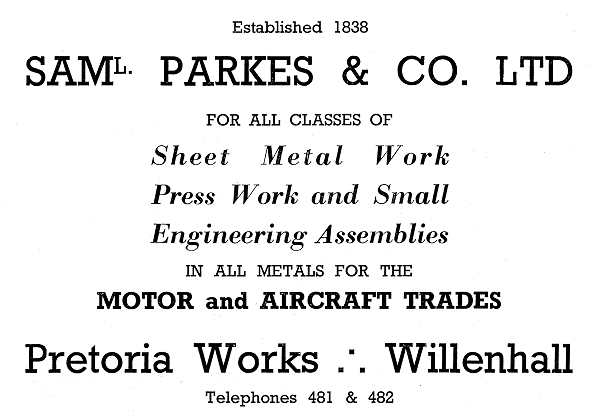
An advert from 1954. |
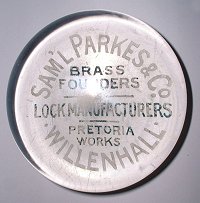 |
On this paperweight the company claims to be lock
manufacturers. However, it is believed that they did not
manufacturer locks themselves, but sold locks made by other people in the
town.
The company's premises stood in
New Road, Willenhall, almost opposite the Locksmith's House.
Thanks to Dr. Joy Duff for the paperweight. |
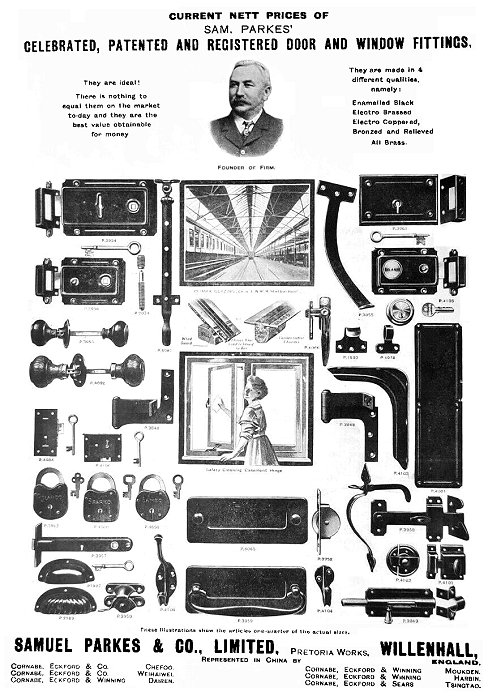
An advert from 1926.
This brass box lock is clearly stamped
Samuel Parkes and Co. Willenhall 1902.If anyone has any
information about the company,
please contact the
webmaster. |
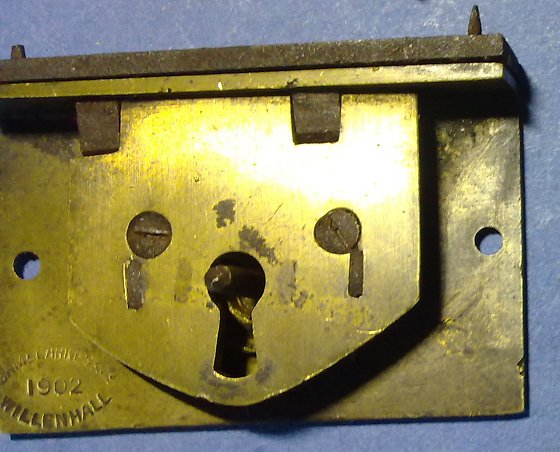 |
|
JOSIAH PEDLEY, VICTORIA WORKS, ST. ANN'S ROAD, WILLENHALL |

Josiah Pedley's lockmaking business was founded in 1868, and
still in production in 1906.
Employees included George Edwin Austin, a master locksmith and
his sons. - Courtesy of David Parsons.
Nothing else is known. |
| View some of the products made at
Victoria Works |
 |
|
|
|
THOMAS PERRY & CO. HIGHFIELD WORKS, BILSTON |
|
Read the
history
of Thomas Perry |

|
|
|
|
| PHILLIPS & SON, SPEEDWELL WORKS, 130 SHERBORNE
STREET, BIRMINGHAM Safe and banking engineers from
1850, also brass and iron bedstead manufacturers. Products
included the company's patent Channel Bolt Strong Room
Doors.
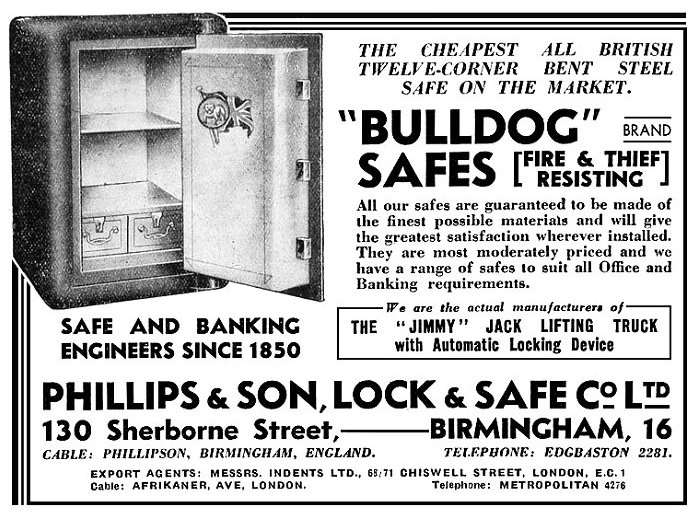
An advert from 1938.

|
|
JOHN PICKEN, BRAY STREET, WILLENHALL
| Brass padlock makers. Not in existence in 1921 or
1970. Existing in 1953. Nothing else known. |
PICKERSGILL-KAYE LTD. 84 SOUTH ACCOMMODATION ROAD,
LEEDS
| See Joseph Kaye and Sons Ltd, (q.v.) who were
established in 1864. |
C. H. PINSON, RELIANCE WORKS, MOAT
STREET, WILLENHALL (1896-1937)
Charles Henry Pinson Snr was born in
Willenhall in 1846 and set up as a lock latch and key maker. He is known
to have been working in 1876 at 23 Cannon Street and in 1888 in Moat
Street. In the 1881 census return Charles lived at 2 Moat Street
and is listed as a padlock maker, employing 6 men and 6 boys. He
had two sons, William Morley (born in 1873) and Charles Henry jnr (born
in Cannon
Street in 1875), who almost certainly would have worked for their father.
By the time Charles Henry Pinson jnr was 21 years of age
he had established his own business, C.H. Pinson Junior. The
"Junior" was to avoid confusion with his father. In 1913 Charles
junior purchased the firm of John Minors (q.v.) in Union Street and when
his father died in the same year he took control of his business
interests. From then on the company address seems to have been
Union Street. In 1916 he bought a controlling interest in the firm
of Beddow and Sturmey. In 1919 he was elected to the Willenhall
Urban District Council, he became a local JP and he died in 1934. The
business was incorporated into Heenan Beddows and Sturmey (q.v.) in
1937. (ref. Street Names of Willenhall) |
ENOCH PINSON LTD, DALE WORKS, DIMMINGSDALE,
WILLENHALL
|
The company was founded in 1876 in
Newhall Street, but it is thought that it existed long before
that date. By 1878 the business had moved to 95 Newhall Street and sold goods to J. Hodson
(Now The Locksmith's House, Willenhall.) In 1888 the
company was
at Dale Works.
Enoch Pinson (1840-1900) lived at 61 New Road,
Willenhall (in 1999, a dentist's). Enoch was the first person to
be buried in Bentley cemetery. (Horace Davies) |
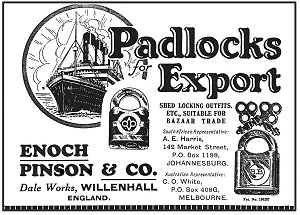 |
|
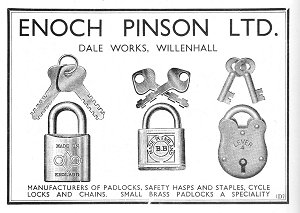
An advert from 1950. |
Between 1895 and 1901 a number of
patents (12361, 16064, 24546) were taken out by E. Pinson and also F. W.
Pinson trading as E Pinson.
Enoch Pinson (1840-1900) was the grandfather of Mrs R. B.
Stone, "Dunley", Bovey Tracey, Newton Abbot, Devon. TQ13 9PW. (She
wrote to the Lock Museum in 1995)
The greater proportion of their output was the
manufacture of brass pin tumbler padlocks. |
| A Frederick William Pinson padlock
from 1927. |
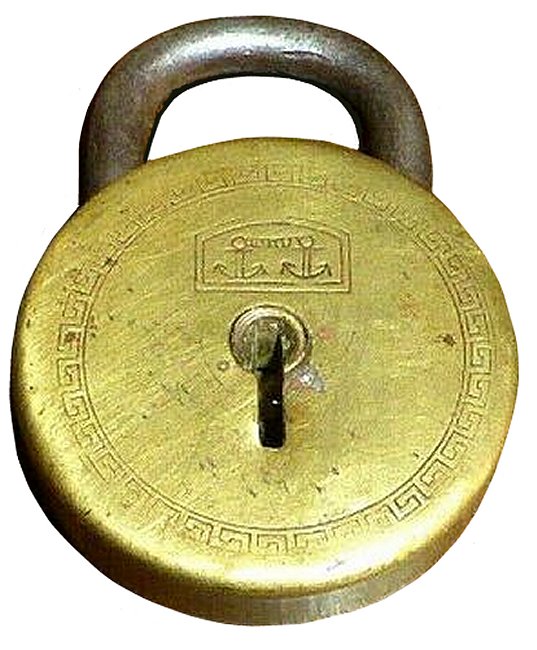 |
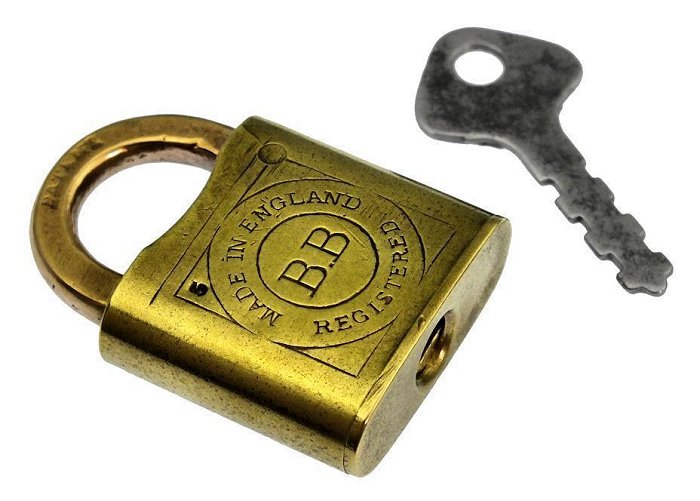
| This letterhead (provided by Trevor Dowson) is
dated 1958. The directors are given as B. B. Pinson and
R. I. Pinson; and they not only make locks and keys and hasps and
staples, but also metal small wares and they undertake light
engineering. |
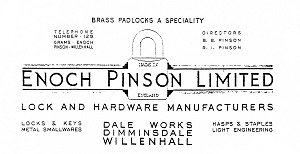 |
|
|
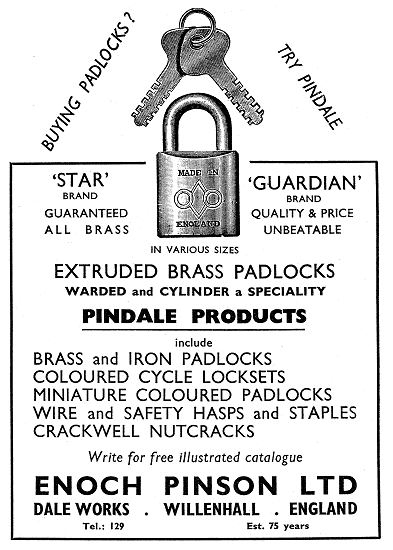
An advert from 1958. |
In 1976 they were run by Mr. Dear. They were
taken over for a short period by Mr. Jordan and his son, who
lived at Cheltenham.
They were taken over by Delaphena
Honing Limited of Cheltenham in October 1989, and became a division
of Security Engineers plc who also owned Securefast (q.v.).
As
the works of Pinson and Securefast were next to each other they
were combined into one manufacturing unit, although continuing
to sell under both the SECUREFAST and PINSON names. |
W. M. PINSON AND SON LTD. HOLDFAST WORKS, CEMETERY ROAD,
WILLENHALL.
|
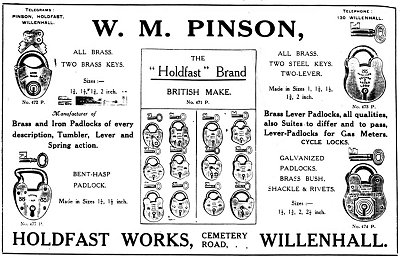 |
Run by William Morley Pinson, the
son of Charles Henry Pinson snr. The premises were on the corner of
Moat Street and Cemetery Road.
They were manufacturers of brass
and iron padlocks. The company is shown in trade directories as existing
in 1921 but not 1914. Could it be that William left C. H. Pinson and
set up on his own when his father died? |
|
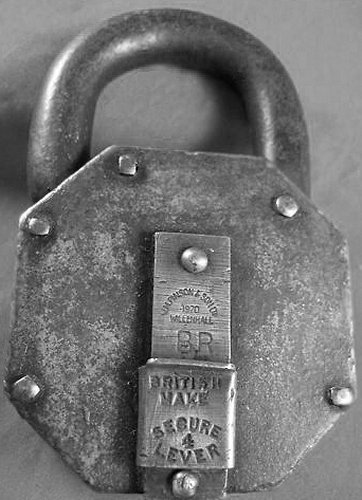 |
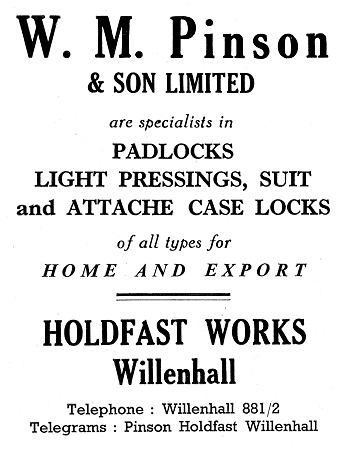
An advert from 1954. |
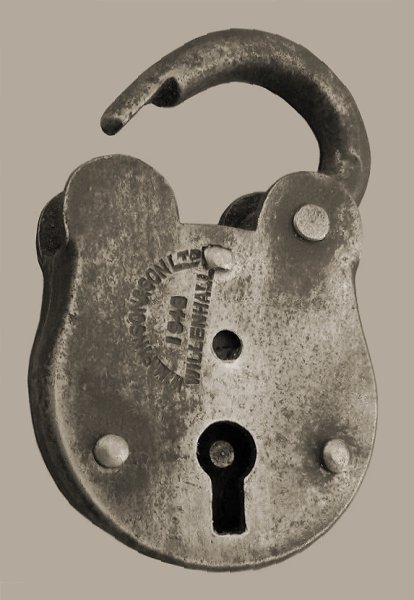 |
A padlock made by W. M. Pinson
in 1948. |
| A padlock made by W. M.
Pinson & Son Limited in 1966. |
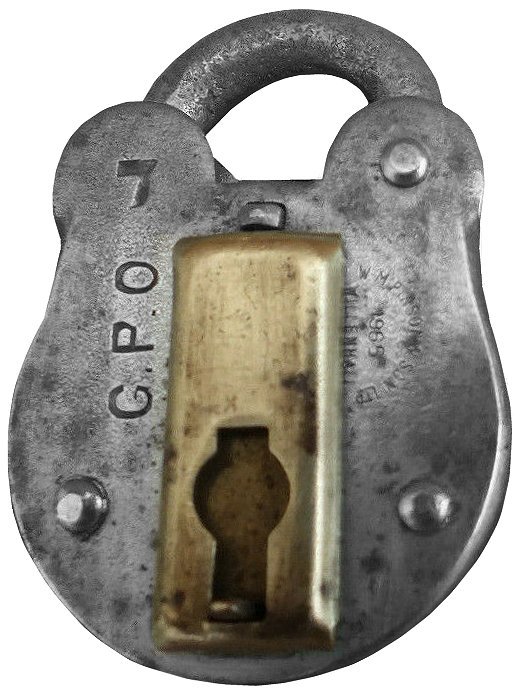 |
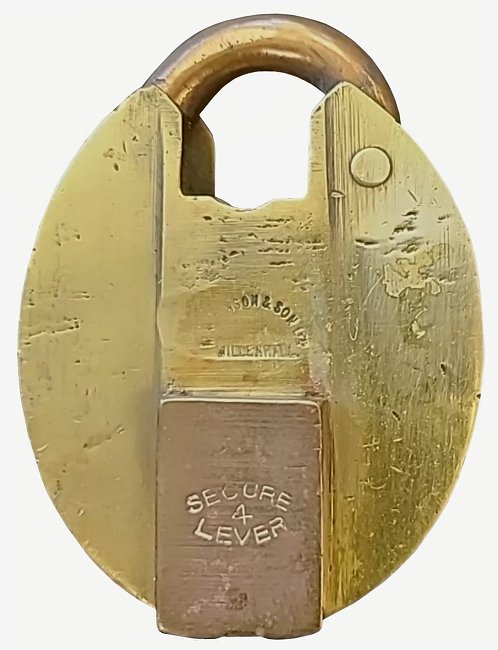 |
A W. M. Pinson &
Son Limited padlock. |
| In the 1950s took over Banks & Rushton. Existing
in 1974. Taken over by J. Legge and Sons Ltd. in 1970s. |
THOMAS POOLE AND SONS, EZEKIEL LANE, SHORT HEATH,
WILLENHALL
WILLIAM POOLE, COPPICE LANE, WILLENHALL
|
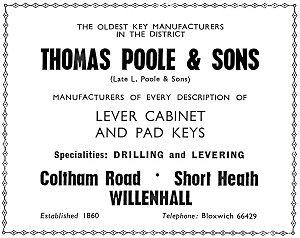 |
Originally the business was started by Levi Poole,
a master keysmith, in 1860 in Swan Lane (Ezekiel Lane) and then
later run by his two sons, Thomas (b 1867) and William (b 1866).
At some point the brothers split up and started their own
businesses under their own names.
William Poole had a key works in a large wooden building
behind his home in Coppice Lane, near its junction with Mill
Lane. |
| William died on the 23 May 1930 while travelling on a bus or tram
between Walsall and Willenhall, while taking a parcel of keys to a
customer. The business was left to his wife and later to her
sister. It was eventually sold to A & E Squire in the 1940s, who
used the premises as a small tool room.
Thomas Poole and Sons was later run by William and Howard, the sons
of Thomas, until they retired and sold the business to Keys of Steel Ltd
(q.v.) in 1979.
They specialised in the supply of cast iron keys and blanks for
padlocks and cabinet locks.
(Ref. W Pace) (Street Names of Willenhall)
|
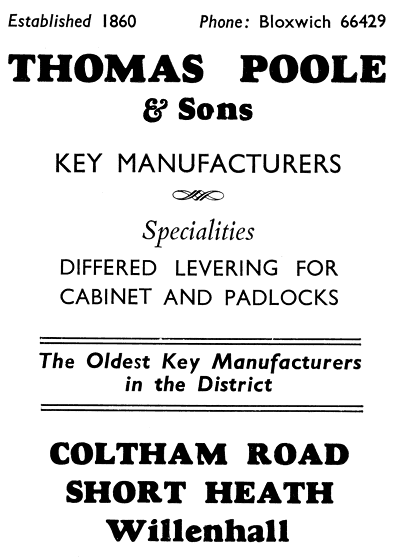
An advert from 1954. |
THE POWER LOCK CO. DEANS ROAD, WOLVERHAMPTON
Specialist in pad, cabinet, brass rim and mortice locks. In
1953/1987 were in Deans Road. Partner's Melvin Pitt and Mike Watkins
(died early 1996). Later moved to new premises at Purbrook Road,
East Park Industrial Estate, Wolverhampton. Taken over by Paveford
Ltd (owner Mr Vaughan), a company on the same industrial estate, on 1st
May 1997.
In August 2001 the company was being offered round the trade for
sale.
CYRUS PRICE AND CO. LTD. BRITANNIA WORKS, WEDNESFIELD
ROAD, WOLVERHAMPTON.
|
|
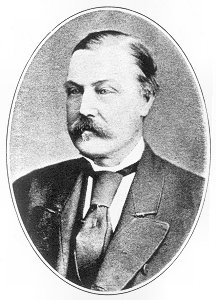
Cyrus Price. |
The firm was established in 1840, by Cyrus Price,
as patent lock and fire resistant safe manufacturers.
The company was written up in the industrial review
"Wolverhampton and South Staffordshire Illustrated" in 1899.
The information and quotations below are taken from this
publication.
The heading to this article underlines the word "Cyrus" in
the company's name, a device which the company seems to have
favoured to distinguish itself from George Price (who similarly
underlined the "George" in their name).
The heading also refers to the company as being at London,
Liverpool and Dublin as well but does not specify the nature of
this representation. |
| "As early as the International Exhibition held in London in 1862,
Messrs Cyrus Price and Co., first placed their manufactures in open
competition with the world's leading makers, where the excellent
qualities of their Holdfast and fire-resisting safes and patent locks
gained the prize medal awarded for new and special improvements. In 1869
this success was repeated at Wolverhampton, and was followed by an award
of the only prize medal at Cardiff in 1888, and a gold medal for second
order of merit at Melbourne, 1888-89". |
| Cyrus Price died in 1895 and the business became a
limited company with Walter Russell Baker as the Managing
Director and W. Vaughan as the other director. Both men
had been with the company for more than 25 years.
The review then goes on to describe the works: " The premises
occupied by the firm, known as the Britannia Safe and Lock
Works, are situated on the Wednesfield Road, within convenient
access of the Great Western, Midland, and London and
North-Western Railways, where a considerable area of ground is
covered by extensive ranges of substantial buildings of varying
elevation, in which manufacturing operations are carried out.
Passing through the offices we notice a handsome show case
containing some splendidly finished samples of safe locks and
movements, the identical exhibit for which the firm gained the
award, previously mentioned, in 1862. |
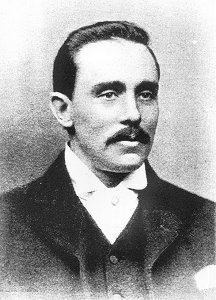
Walter Russell Baker.
|
|
In the rear are spacious smiths' forge, safe-making
shop, locksmiths' and paint shops, with large store for the steel and
iron used in construction."
Then some of the company's products get a mention:
"In their latest type of "Conqueror" and "Eclipse" safes, we were
enabled to realise the high stage of perfection attained by the firm in
their most recent improvements, in which are embodied all details of
construction best calculated to render them impregnable against'
burglarious attacks. We were also shown their Fire- Resisting 212 degree
book safes, with patent solid hardened steel and drill-proof doors,
strong rooms, doors, and frames, and smaller receptacles possessing
equally efficient qualities.
|
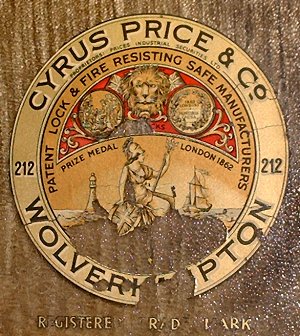 |
This large transfer is in
the Lock Museum. Note that, under the large lettering of
"Cyrus Price and Co", smaller lettering reads:
"Proprietors: Price Industrial Securities Ltd."
This must
be a subsidiary company but its nature is unknown. |
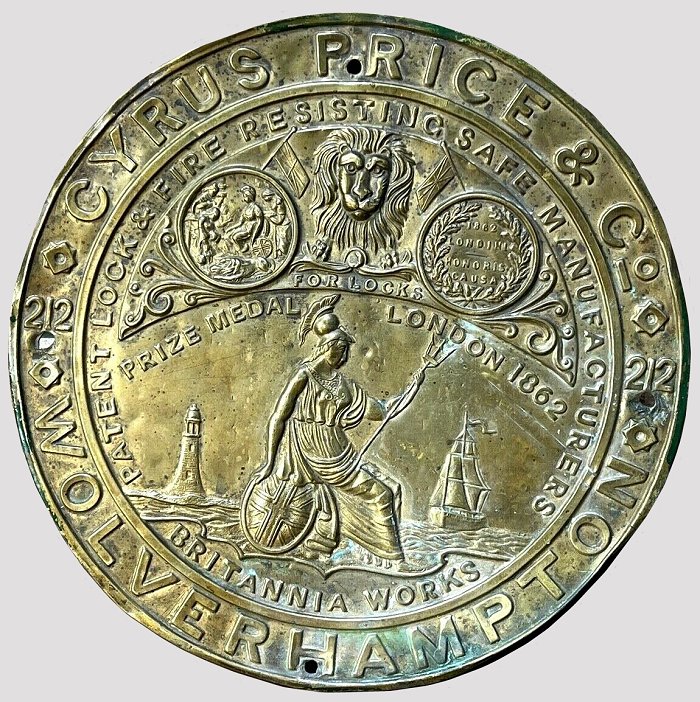
A Cyrus Price safe plate.
| Cyrus Price safe plate in
the Trevor Dowson collection. |
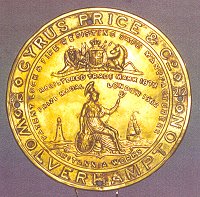 |
|
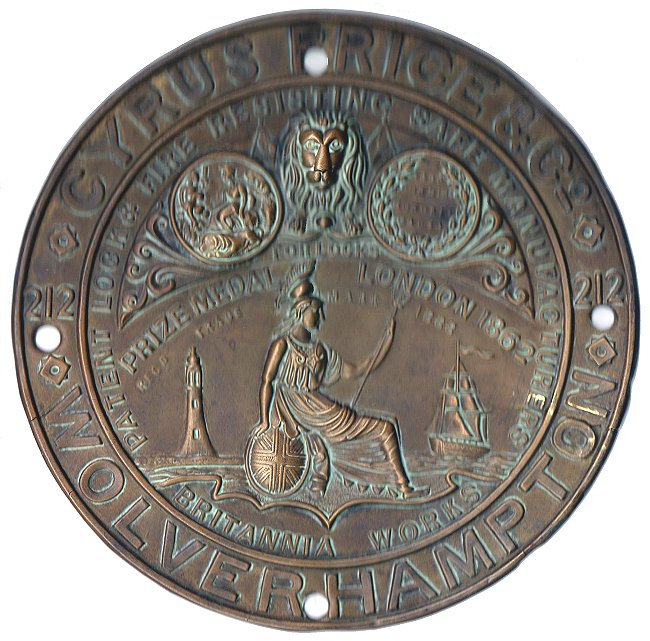
Another Cyrus Price safe plate.
Courtesy of David Parsons. |
| "In the lock department a noteworthy speciality is the
patent prize medal unpickable locks and street door latches, the
invention of the late Mr. Cyrus Price. Commenting on this improvement we
may quote the following extract from the Birmingham Daily Gazette
in dealing with the subject:- "The security of the new lock may
technically be said to consist of a double lever 'reflection' bolt,
standing against either side of the keyhole, which bolt, upon the
introduction of a false key or pick, not only prevents the lifting of
the levers (which is required before the main bolt can be drawn back) by
the action of a bolt-pin which slides into one side of the levers, but
with the same action it effectually bolts the bolt itself. The patentee
claims for his useful invention that the principle renders it almost
impossible for the lock to get out of order with ordinary wear and
usage." |
|
"Other locks manufactured by the firm comprise the
"Champion" detector locks and night latches, cabinet, rim, and mortice
locks and bank locks, most of which are made in sets with a "master key"
to pass the whole.
"Before leaving this department our attention was
invited to the firm's First Class Quadruple Extra Strong Holdfast double
fire-resisting, drill, wedge and crowbar-resisting safe, with massive
doors 1 in. thick, intersected with hardened drill-proof steel, hung on
massive hinges, to shoot large bolts all round, large dovetails in the
doors, cut from the solid to prevent wedging, for the use of bankers,
pawnbrokers, and others requiring to store bullion, plate and other
valuables.
A glance of [sic] this ponderous stronghold would, we should
imagine, deter the boldest burglar from his nefarious design even when
equipped with the best tools employed by exponents of the "cracksman's"
handicraft".
The review then summaries some of the many letters the
company had received about instances where their safes had
resisted burglars, fires and other attacks, including "the
great fire at Beattie's Drapery Stores, Wolverhampton" in
1897. |
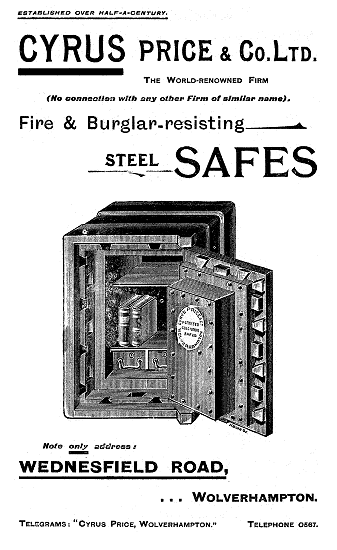
An advert from 1902. |
| And an "almost unique experience may be told of a safe
supplied by this firm to Mr. William Jones, of Sand Quay,
Belfast. In this case the attack was made upon the safe in
question by three burglars, who, being baffled in their
attempt on the "Holdfast" coolly proceeded to convey it to a
barge for transmission to a place where their operations
could be continued with greater security. During this
performance the gang, owing to some alarm, consigned the
safe to the water, from which it was subsequently rescued,
and despite the duration of the immersion the contents upon
examination were found to be comparatively uninjured." |
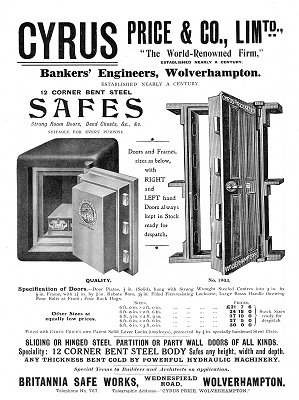 |
This advert, from an unknown source, refers to the
company being almost a century old and so should date from
the 1930s. It refers to "12 corner bent steel safes".
Can anyone explain the "12 corner" reference? By this time
they are also advertising strong room doors, deed chests,
and "sliding or hinged steel partition or party wall doors
of all kinds", suggesting a widening of their range.
They also say that the safes are "fitted with Cyrus
Price's own patent solid lever locks", suggesting that they
made their own, unlike many safe makers who bought in the
locking mechanism. |
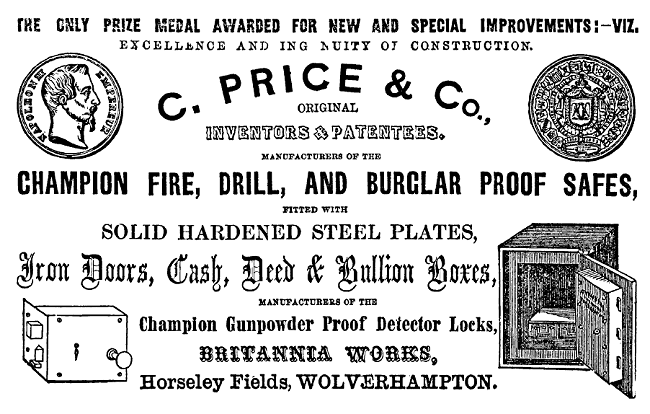
An advert from 1861.
| The company took out many patents for various
inventions. What follows is a number of notices that
appeared in the London Gazette in the 1860s and 1870s:

London Gazette, 16th March, 1860.
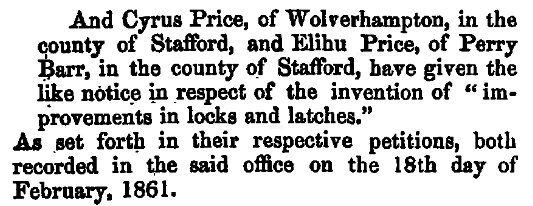
London Gazette, 18th June, 1861.

London Gazette, 13th March, 1863.

London Gazette, 30th November, 1866.

London Gazette, 9th October, 1868.

London Gazette, 6th September, 1878. |
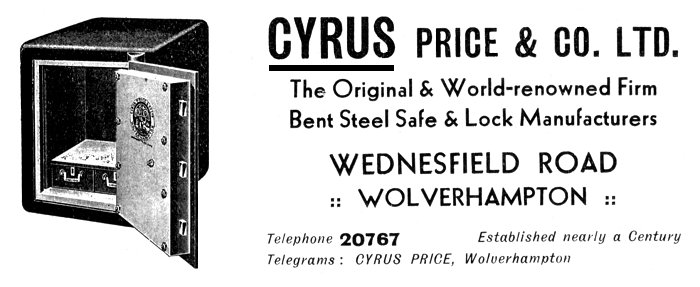
An advert from 1938.
| Cyrus Price & Company Limited went into liquidation in
1933:
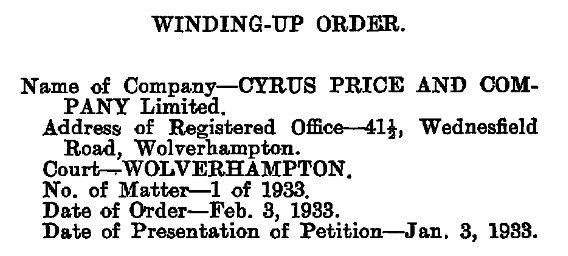
London Gazette, 7th February, 1933.
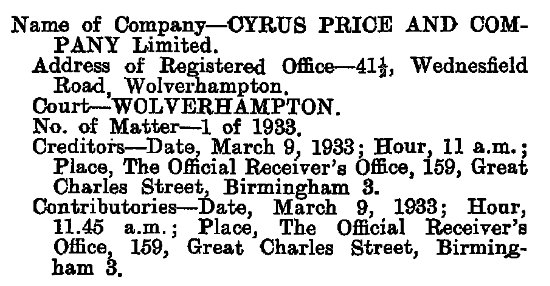
London Gazette, 28th February, 1933.
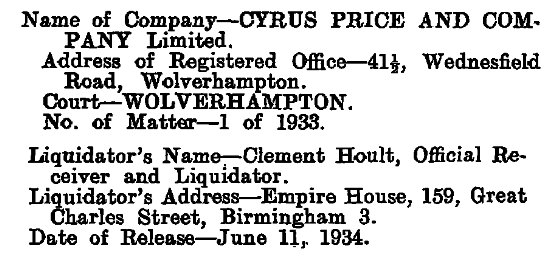
London Gazette, 10th June, 1934.
The business was acquired by James
Gibbons in the late 1930s. |
|
|
| Read an article
about Cyrus Price and Company Limited |
 |
| |
|
| View the 1907 Cyrus
Price catalogue |
 |
| |
|
|
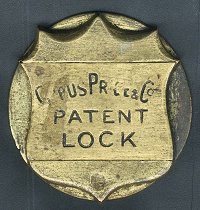 |
GEORGE PRICE, CLEVELAND SAFE AND LOCK WORKS,
CLEVELAND STREET, WOLVERHAMPTON |
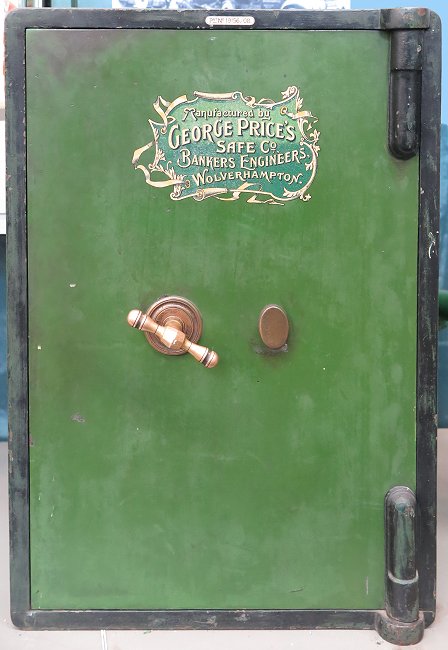 |
The George Price safe that can be seen in
Hall 1, in the Rolfe Street Baths building, at the Black Country Living
Museum, in Dudley. |
|
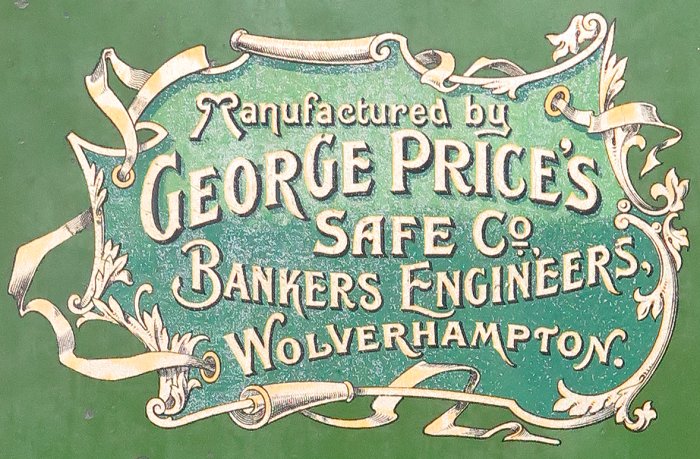
From the safe above. |
|
W. H. PRITCHARD, NEACHELLS LANE, WEDNESFIELD,
WOLVERHAMPTON
Manufacturers of a special two lever lock, specially
made for fitting into a cabinet/chest/box they make. Had a factory
in Wolverhampton. Were taken over by Richards and Ross Ltd on the
4th January 1989 and production moved to their Neachells Lane
site. Richards and Ross Ltd is an engineering company that had
been established in Wednesfield from the 1930s.
|
|
 |
|
 |
| Return to Locks
and Safes |
|
Return to the
list of makers |
|